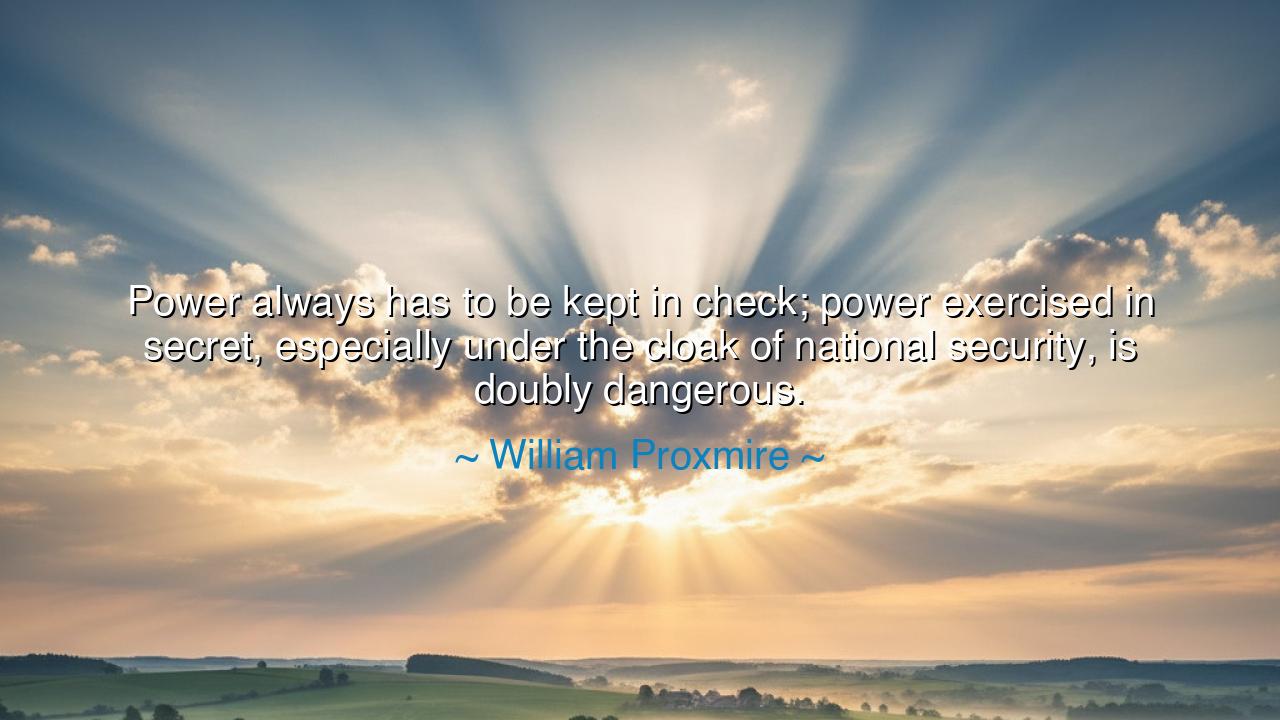
Power always has to be kept in check; power exercised in secret
Power always has to be kept in check; power exercised in secret, especially under the cloak of national security, is doubly dangerous.






Hearken, O children of vigilance, to the solemn counsel of William Proxmire, who speaks of the perils inherent in power unrestrained. He warns that all authority, no matter how sanctioned, must be carefully kept in check, for when it operates without oversight, it becomes a force capable of oppression and corruption. Herein lies a teaching for the ages: the guardians of society must balance strength with accountability, and wisdom with restraint, lest power itself become a tyrant.
The origin of this reflection lies in Proxmire’s life as a statesman and senator in the United States, who observed the use and abuse of governmental authority in both open and secret forms. He understood that power, when exercised under the guise of national security or hidden from public scrutiny, acquires a dangerous potency, capable of subverting justice, liberty, and the very principles it was meant to uphold. In his vision, transparency and accountability are the shields against the tyranny of secrecy.
The meaning of this aphorism is profound: power, even when wielded for ostensibly noble ends, becomes perilous if unchecked or concealed. Authority exercised in secret grows beyond the bounds of moral and civic responsibility, and the cloak of security can obscure acts that would otherwise be condemned. Proxmire teaches that society flourishes only when power is visible, accountable, and restrained by principles and law.
History provides vivid illustration. Consider the reign of King Louis XIV of France, whose absolute monarchy concentrated power in his own hands. Behind the walls of Versailles, decisions affecting the lives of millions were made with little oversight, and the secrecy of courtly counsel shielded abuses and misjudgments. The unchecked power of a single ruler, hidden from the scrutiny of those governed, led to oppression, revolt, and long-term instability, confirming Proxmire’s warning of the dangers of secret power.
Moreover, this teaching extends to all forms of governance and leadership. The commander, the magistrate, and the official all carry authority that must be monitored and balanced. The temptation to act in secrecy, even in the name of safety or expedience, must be resisted, for concealment amplifies the capacity for harm. True strength lies not in unrestricted dominion, but in power wielded openly, tempered by law, conscience, and the vigilant eyes of the people.
O generations yet unborn, take this counsel into your hearts: guard against the seduction of hidden authority, demand accountability, and keep power in check. For when authority is exercised in secret, especially under the mantle of security, it becomes doubly perilous, capable of eroding liberty, justice, and the moral fabric of society. Let transparency and vigilance be your guide, and let wisdom temper every act of power across the ages.






ATle pham anh tuyet
Reading this quote makes me think about the psychological and systemic effects of secretive authority. Does hiding power from scrutiny inherently corrupt those who wield it, or is it the absence of checks that creates danger? I also wonder whether modern technology and surveillance create new layers of invisible power that are even harder to monitor. How do citizens maintain oversight in an era where secrecy is both more feasible and more tempting?
HNhung nguyen
This statement raises important questions about the ethical limits of power. If leaders act without accountability, particularly under secrecy, who ensures justice or prevents misuse? I’m curious how societies can develop mechanisms to check such power without compromising legitimate security needs. Is there a tension between freedom and protection that is unavoidable, and how do we balance the right to know with the need for operational discretion?
PTPhan Tuyen
I find this perspective compelling because it highlights the need for safeguards and oversight. Could power exercised under the guise of national security lead to abuses that citizens might never detect? It also prompts reflection on historical examples—are there instances where secrecy justified by safety or security resulted in injustice or loss of rights? This makes me question whether public awareness and transparency are always compatible with effective protection.
TPNguyen Thanh Phu
Reading this, I’m struck by the idea that secrecy amplifies the dangers of power. Does this mean that any unchecked authority is likely to become corrupt, or only when it’s hidden from public scrutiny? I also question how modern intelligence agencies, military operations, or emergency powers fit into this framework. Can society design systems to monitor secretive operations effectively, or is some level of risk unavoidable when security is involved?
THThu Hong
This quote makes me reflect on the tension between authority and accountability. If power is exercised in secret, how can citizens ensure that it is not abused? I also wonder how governments can balance national security with transparency. Is it possible to maintain secrecy for protection without compromising democratic oversight, or does any hidden power inherently carry the risk of corruption? It raises fundamental questions about trust and vigilance in governance.